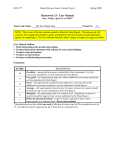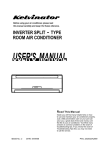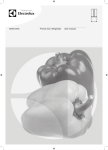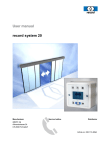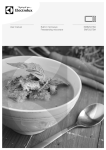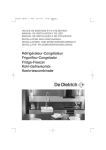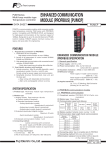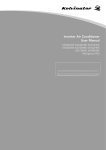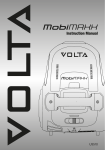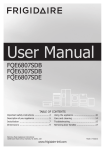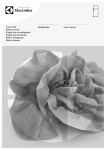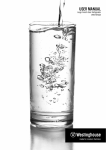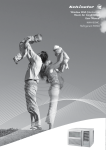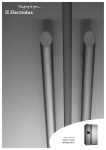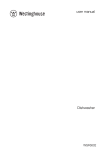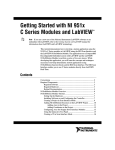Download USER MANUAL - ProductReview.com.au
Transcript
USER MANUAL Top Mount Frost Free Refrigerator Freezer WTM1800WC WTM2000WC congratulations contents Congratulations and thank you for choosing our refrigerator/freezer. We are sure you will find your new appliance a pleasure to use. Before you use the appliance, we recommend that you read through the relevant sections of this manual, which provides a description of your appliance and its functions. Important safety instructions . . . . . . . . . . . . . 3 To avoid the risks that are always present when you use an electric appliance, it is important that the appliance is installed correctly and that you read the safety instructions carefully to avoid misuse and hazards. We recommend that you keep this instruction booklet for future reference and pass it on to any future owners. After unpacking the appliance, please check it is not damaged. If in doubt, do not use the appliance but contact your local customer care centre. conditions of use This appliance is intended to be used in household and similar applications such as: • Staff kitchen areas in shops, offices and other working environments • Farm houses • By clients in hotels, motels, and other residential type environments • Bed and Breakfast type environments TIPS & INFORMATION Important – CHECK FOR ANY DAMAGES OR MARKS. If you find the refrigerator is damaged or marked, you must report it within 7 days if you wish to claim for damage/marks under the manufacturers warranty. This does not affect your statutory rights. ENVIRONMENTAL TIPS Information on disposal for users • Most of the packing materials are recyclable. Please dispose of those materials through your local recycling depot or by placing them in appropriate collection containers. • If you wish to discard this product, please contact your local authorities and ask for the correct method of disposal. CONTENTS 2 WTM1800WC features . . . . . . . . . . . . . . 4 WTM2000WC features . . . . . . . . . . . . . . 5 Installing your new appliance . . . . . . . . . . . . 6 Ventilation around your appliance. . . . . . . . . . 6 Installing your refrigerator . . . . . . . . . . . . 6-7 Initial start-up . . . . . . . . . . . . . . . . . . . . 7 Using your appliance . . . . . . . . . . . . . . . 7-8 Making ice . . . . . . . . . . . . . . . . . . . 8 Removing/replacing chiller door & drawer . . . . . . . 9 Replacing the lamp (WTM1800WC) . . . . . . . . . 9 Replacing the lamp (WTM2000WC) . . . . . . . . 10 General information . . . . . . . . . . . . . . . . 11 Cleaning the appliance . . . . . . . . . . . . 11 Safety . . . . . . . . . . . . . . . . . . . . 11 Switching off your appliance . . . . . . . . . . 11 Reversing the door opening direction . . . . . . . 12 Troubleshooting . . . . . . . . . . . . . . . . . . 14 Warranty . . . . . . . . . . . . . . . . . . . . 15 Important safety instructions Please read the user manual carefully and store in a handy place for later reference. The symbols you will see in this booklet have these meanings: WARNING This symbol indicates information concerning your personal safety CAUTION This symbol indicates information on how to avoid damaging the appliance TIPS & INFORMATION This symbol indicates tips and information about use of the appliance ENVIRONMENTAL TIPS This symbol indicates tips and information about economical and ecological use of the appliance Meanings of symbols used in this manual are shown below: This symbol indicates never to do this This symbol indicates always do this WARNING • If pressurised aerosol containers bear the word ‘flammable’ and/or a small flame symbol, do not store them inside any refrigerator or freezer. If you do so you may cause an explosion. • When you dispose of your old refrigerators and freezers, remove any doors. Children can suffocate if they get trapped inside. • This appliance contains insulation formed with flammable blowing gases. Avoid safety hazards by carefully disposing of this appliance. WARNING The refrigerator must be plugged into its own dedicated 220-240V, 50Hz AC electrical outlet. The plug must be accessible when the refrigerator is in position. It is essential the power point is properly earthed to ground. Consult a qualified electrician if you are unsure. Don’t use extension cords or adapter plugs with this refrigerator. If the power cord is damaged, have it replaced by a qualified service technician. Unplug the refrigerator before cleaning it, or changing the light bulb to avoid electric shock. Never unplug the refrigerator by pulling the electrical cord as this may damage it. Grip the plug firmly and pull straight out. Choose a location for your refrigerator that isn’t too cold. The ambient room temperature should be above 10°C. Stand your refrigerator in a dry place – avoid areas of high moisture or humidity. Don’t put the refrigerator in frosty or unprotected areas like a garage or on the verandah. Keep the refrigerator out of direct sunlight. Don’t locate the refrigerator near stoves, fires or heaters. When installed correctly, your refrigerator should: – Have adequate space at the back and sides for air circulation (refer to page 6). – Be aligned to the surrounding cupboards. – Have doors that will self-close from a partially open position. WARNING R600a refrigerant warning This appliance may contain a small quantity of environmentally friendly, but flammable, non-synthetic R600a refrigerant: • Ensure that the tubing of the refrigerant circuit is not damaged during transportation and installation. • The room for installing appliance must be at least 1m3 per 8g of refrigerant. The amount of refrigerant charged in the appliance can be found on the rating plate on the appliance. •Keep ventilation openings in the appliance enclosure or in the built-in structure, clear of obstruction. •Do not use mechanical devices or other means to accelerate the defrosting process, other than those recommended by the manufacturer. 3 SAFETY WTM1800WC features 1 16 2 3 17 4 5 6 18 7 8 19 9 10 11 20 19 20 16 12 21 13 14 22 15 1 Top cover 9 Temperature sensor 17 Top freezer bin 2 Freezer control slide 10 Fast chill zone sticker 18 Bottom freezer bin 3 Fan housing 11 Light switch 19 Egg trays 4 Wire freezer shelf 12 Wire shelves 20 Full width fridge door bin 5 Ice bin 13 Crisper cover 21 Half width fridge door bin 6 Ice tray 14 Vegetable crisper 22 Bottom fridge door bin 7Refrigerator control knob 15 Levelling legs 8 Light 16 Door gaskets/seals Features may vary depending on model. Not all models will have features listed. SAFETY 4 WTM2000WC features 1 18 2 3 4 5 6 19 7 8 9 20 10 11 12 13 21 14 20 22 15 16 18 23 17 1 Top cover 9 Chiller drawer 17 Levelling legs 2 Freezer control slide 10 Light 18 Door gaskets/seals 3 Fan housing 11 Temperature sensor 19 Freezer bin 4 Wire freezer shelf 12 Fast chill zone sticker 20 Egg trays 5 Ice bin 13 Light switch 21 Full width fridge door bin 6 Ice tray 14 Wire shelves 22 Half width fridge door bin 7 Chiller door 15 Crisper cover 23 Bottom fridge door bin 8Refrigerator control knob 16 Vegetable crisper Features may vary depending on model. Not all models will have features listed. 5 SAFETY installing your new appliance Adequate ventilation around your refrigerator. Before you move your appliance into the place where it will operate, check that it will have adequate clearance. Clearance is required for air circulation and too little clearance may affect the performance of your appliance. We recommend minimum clearances of: •30mm on each side. •25mm above the refrigerator. •50mm minimum/75mm maximum behind the refrigerator 1. Move the appliance into its final position. 2. If the appliance is not tilting back as described earlier, minor adjustments can be made to the two front levelling legs by turning the feet in an anticlockwise direction (below). This will increase the height of the feet. If you have difficulty turning the foot, have someone tilt the appliance back to gain better access. If it is not tilted back enough and the levelling legs are fully extended, additional packing might be required (see note 4 for appropriate materials). Recommended airspace 30mm 30mm 50mm (75mm max) CABINET DOOR NOTE: Doors are designed to sit proud of cabinetry (not flush). The clearances shown above are the recommended minimum clearances. The clearance at the rear must not exceed 75mm. Installing your refrigerator or freezer The appliance should arrive with the front levelling feet wound up. The appliance may need to be tilted backward at the top by about 10-15mm from vertical (see diagram below). This will allow the door to gravitate to the closed position. The complete closure of the door seal is reliant on manually pushing the door closed to provide a consistent door seal. 3. Compare the alignment of the appliance to the surrounding cupboard. The top of the appliance should be level from side to side (see diagram below). If you need to adjust the level, use the levelling feet as detailed in step 2. spirit level parallel to cupboards 10 –15mm Height adjustable front rollers CAUTION The rollers are designed for forward or backward movement only. They are not castors. Moving the refrigerator sideways may damage your floor and the rollers. 4. If the appliance now rocks from one corner to the opposite rear corner, this means that the floor is uneven. You may need to put some packing under the ridge to the rear of the appliance. You could use thin pieces of solid material such as thin board, vinyl floor tiles or laminate. 5. You may now need to fine tune the installation by repeating steps 2, 3 and 4. 6. Wipe off any dust that has accumulated during shipping and clean following the directions on page 11. 7. Plug the appliance into the power point. Don’t use a double adaptor or extension cord. 8. It is recommended that you let the appliance operate for an hour or two (three hours for a freezer) before you put any food in it. This will confirm that it is operating correctly and make the conditions appropriate for food storage. Congratulations! You have successfully installed your refrigerator/freezer. INSTALLATION 6 initial start-up using your appliance Your appliance was cleaned and polished before it left the factory. Before use, dust and wipe over inside and out using a clean dry cloth. This product is designed to operate on a power supply of 220/240 volts 50Hz. Connect to a separate power point with a correctly earthed three pin socket. Do not use double adaptors. General Information The refrigerator/freezer transfers heat from food placed inside to the outside air. This process makes the rear and sides of the outer cabinet feel warm to touch, particularly at initial start up. This is normal. Make sure you fully close the freezer door after loading or removing food. If the door is left partly open, a heavy frost will coat the inside of the freezer. Ensure that bins and shelves are pushed all the way in to prevent the door being held open. If the unit is unplugged, power lost, or turned off you must wait 5 minutes before restarting the unit. If you attempt to restart before this time delay, the freezer will not start. Controlling the temperature in your refrigerator To make the appliance operate you must turn the knob clockwise. For all models, ‘Less Cold’ corresponds to the warmest temperature while ‘Colder’ the coldest. When the ambient room temperature is 16°C, a setting of half way between ‘Less Cold’ and ‘Mid’ would be appropriate. When the ambient room temperature is 25°C, a setting of half way between ‘Mid’ and ‘Colder’ could be selected. Controlling the temperature in your freezer The freezer slide control is used to balance the air flow between the freezer and the refrigerator compartments. The main temperature control is the control knob in the refrigerator compartment. For optimum performance position the freezer control on ‘Less Cold’. If the food is not frozen enough you may be required to move the slide control (or knob) towards the ‘Colder’ position When you change temperature settings, make small adjustments and wait 24 hours before assessing whether you need to make further changes. features and general hints • Try not to leave the door open for too long, especially in warm and humid climates. • It is recommended that you wrap all food in freezer bags. • Corned or pickled products (containing salts) must NOT be stored in the freezer unless thoroughly sealed. Salts cause metal oxidisation. •In some circumstances (particularly after recent opening and closing of the door) you may experience a heavier than normal resistance when opening the door. Should this occur wait a minute or two between openings to stabilise the air pressure within the cabinet. •If going away for an extended period, turn your freezer off, remove all foods and dry interior thoroughly. Unplug the freezer from the electrical outlet and leave the door open. •If there is a power failure, do not open the door. Frozen foods will stay frozen for up to 24 hours depending on temperature and load conditions if the door is kept closed. •It is recommended that to ensure safe food storage, the freezer operates for 3 hours with the door closed before being stocked with food. It is also recommended that you wait until the following day before you purchase additional food, either frozen or unfrozen, to stock your freezer. defrosting Defrosting takes place automatically. The defrost water flows down to the evaporating tray, which is located in the machine compartment and is evaporated automatically. 7 INSTALLATION using your appliance ice making To make ice cubes, fill the ice tray with water and place it in the ice box. Avoid filling above the ice box grid to facilitate ice release. To remove ice cubes easily, run water on the tray before gently twisting the tray and inverting. suggestions on food storage Refrigerator Compartment • Store fresh food in the refrigerator compartment. How food is frozen and thawed is an important factor in maintaining its freshness and flavour. •Do not store fruit that spoils easily at low temperatures, such as bananas, pineapples and melons. •Give hot food time to cool prior to storing. Placing hot food in the refrigerator could spoil other food and lead to higher power bills. •When storing, cover food with cling wrap or store in a container with a lid. This will prevent moisture from evaporating and helps food keep its taste and nutrients. •Do not block air vents with food. Unhampered circulation of chilled air keeps refrigerator temperatures even. •Do not open the door frequently. Opening the door allows warm air into the refrigerator causing temperatures to rise. •Avoid placing moist food deep inside refrigerator shelves. It could freeze upon direct contact with the cold air straight from the vents. •Always clean fruit and vegetables prior to refrigeration. These should be washed and wiped to prevent adjacent foods from spoiling. • When storing eggs in the trays provided, ensure that they are fresh and always store them in an upright position to keep them fresh longer. OPERATION 8 Freezer Compartment • Do not store bottles in the freezer compartment as they may break when frozen. •Do not re-freeze food that has been thawed. •When storing frozen foods like ice cream for an extended period, place it on the freezer shelf not in the door bin. removing and replacing the chiller door & drawer lamp replacement Instructions for model WTM2000WC In order to access the light housing, the chiller door and chiller drawer need to be removed. The reversing of doors or replacement of light bulbs is not covered by warranty. Assistance, if required can be arranged by calling our service centre on 13 13 49. Normal service call and labour charges apply. There is a node on each side at the top of the chiller door. These ‘nodes’ allow the door to swivel open and shut and also secure the door to ‘C ’ shaped clips on each side of the refrigerator liner. The clip on the left liner wall faces the back of the refrigerator, while the clip on the right liner wall faces the front. To remove the door, push back against the left top corner of the door, while pulling the top right corner of the door forward. Instructions for model WTM1800WC 1. Switch off the power at the power point and remove the cord by pulling the plug. 2. Remove the screw from the centre of the control panel. 3. Apply pressure with your finger tip to the top centre of the light lens. This will release a catch on the back face of the lens that holds it to the light housing. 4. Remove the lens. Remove the chiller door. Pull the chiller drawer forward to the point of resistace, raise slightly and slide out. 5. Unscrew the light bulb in an anti-clockwise direction. To replace the chiller door, slot the node on the top left hand corner of the chiller door, left into the clip on the cabinet lining. Push the node on the top right corner of the chiller door, back into the clip on the cabinet lining. 6. Screw the new light bulb into place using a cloth. Do not allow your fingers to touch the new bulb as the oils from your skin can cause hot spots on the globe, shortening its life. 7. Clip the light lens on and replace the screw. 8. Wait 5 minutes to ensure pressures in the refrigeration system are equalised, before turning the refrigerator on at the power point. WARNING Never insert your finger into the light bulb socket. 9 OPERATION lamp replacement Instructions for model WTM2000WC 1. Switch off the power at the power point and remove the cord by pulling the plug. 2. Remove the screw from the centre of the control panel. 3. Apply pressure with your finger tip to the top centre of the light lens. This will release a catch on the back face of the lens that holds it to the light housing. 5. Unscrew the light bulb in an anti-clockwise direction. 6. Screw the new light bulb into place using a cloth. Do not allow your fingers to touch the new bulb as the oils from your skin can cause hot spots on the globe, shortening its life. 7. Clip the light lens on and replace the screw. TIPS & INFORMATION 4. Remove the lens. OPERATION 10 Not all 15 watt screw-in lamps will fit the lamp housing. Appropriate replacement lamps can be purchased from Electrolux or by calling 13 13 50. Cleaning the refrigerator WARNING BEFORE CLEANING: Turn the refrigerator off at the power point and unplug the cord to prevent any chance of electrocuting yourself. • Doors and exterior (white & pacific silver) You should only clean the doors with lukewarm soapy water and a soft cloth. • Stainless Steel Your stainless steel refrigerator is manufactured from mark-resistant stainless steel. This stainless steel has a special advanced protective coating that eases the removal of marks such as fingerprints and water spots. To keep its appearance, clean it regularly with lukewarm soapy water and a soft cloth. CAUTION Never use stainless steel cleaners, abrasive pads or other cleaners that will scratch the surface. Damage to the appliance after delivery is not covered by your warranty. • Interior Clean the inside of your refrigerator regularly with a soft cloth, unscented mild soap and lukewarm water. Thoroughly dry all surfaces and removable parts and avoid getting water on the controls. Replace removable parts, plug power cord in and switch the power on before returning the food. • Door seals Always keep door seals clean by washing them with a mild detergent and warm water, followed by a thorough drying. Sticky food and drink can cause seals to stick to the cabinet and tear when you open the door. CAUTION Never use hot water, solvents, commercial kitchen cleaners, aerosol cleaners, metal polishes, caustic or abrasive cleaners, or scourers to clean your refrigerator. Many commercially available cleaning products and detergents contain solvents that will damage your refrigerator. Use only a soft cloth with an unscented mild soap and lukewarm water. If your refrigerator has telescopic extension slides, simply wipe them with a damp cloth to clean them and never immerse them in water. Safety This appliance is not intended for use by persons (including children) with reduced physical, sensory or mental capabilities, or lack of experience and knowledge, unless they have been given supervision or instruction concerning use of the appliance by a person responsible for their safety. Children should be supervised to ensure that they do not play with the appliance. always do this Check the power point is properly earthed – if you are not sure get an electrician to check it. Switch off and unplug the refrigerator at the power point before you clean or move it. If the power supply cord is damaged, have it replaced by the manufacturer, service agent or similarly qualified person. never do this Never let children play with the refrigerator. Never store spray cans, explosive fluids or flammable liquids in the refrigerator. Never store fizzy drinks in the freezer compartment. Never lick icy foods when they first come out of the freezer. This can burn your your lips and mouth. Never try to repair the refrigerator yourself. Never use electric heaters or dryers to defrost the freezer because you can receive an electric shock. Never use electrical appliances inside the food storage areas. This appliance contains insulation formed with flammable blowing gases. For safety reasons, take care when you dispose of it. Do not damage the appliance circuit. WARNING When you dispose of your old refrigerator or freezer, remove any doors to prevent children from being trapped inside. WARNING R600a refrigerant warning This appliance may contain a small quantity of environmentally friendly, but flammable, non-synthetic R600a refrigerant: • Ensure that the tubing of the refrigerant circuit is not damaged during transportation and installation. • The room for installing appliance must be at least 1m3 per 8g of refrigerant. The amount of refrigerant charged in the appliance can be found on the rating plate on the appliance. •Keep ventilation openings in the appliance enclosure or in the built-in structure, clear of obstruction. •Do not use mechanical devices or other means to accelerate the defrosting process, other than those recommended by the manufacturer. •The room for installing appliance must be at least 1m3 per 8g of refrigerant. The amount of refrigerant charged in the appliance can be found on the rating plate on the appliance. Switching off your refrigerator If you switch your refrigerator for an extended period, follow these steps to reduce the chances of mould: 1. Remove all food. 2. Remove the power plug from the power point. 3. Thoroughly clean and dry the Interior. 4. Ensure that all the doors are wedged open slightly for air circulation. 11 GENERAL INFORMATION reversing the door opening direction In this example, the operation is reversed from right side hinging to left side hinging. precations •Turn off the appliance •Unplug the power cable •Remove all food from the appliance •Remove shelves and baskets •Do not lay the appliance down flat on its back as this will impair its operation. •When tilting the appliance to access the underside, support it so that it will not fall to the floor. 4 2 1 4 2 3 3 5 6 7 8 NOTE: All parts removed must be retained to reinstall the door. Ensure washers are reassembled in original order. instructions •In the front of the panel (1) on top of the freezer compartment there are 2 rectangular plugs (2). Use a flat bladed screwdriver as a lever to gently remove them. •Use a Phillips head screwdriver to remove the screws (3) that the plugs were concealing. • There are 2 round holes in the back of the top panel (1). Remove the screws (4) from these holes. •The top panel (1) can now be removed. •Hold the freezer door in the closed position while removing the 3 screws (5) that secure the top hinge (6). •The freezer door can now be lifted off along with the top hinge. •Remove the top hinge pin (7) from the hole in the top of the freezer door. •Now unscrew the hinge pin (7) from the hinge (6). Turn the hinge over and screw the pin (7) in from the other side of the hinge (6). •On the left top of the appliance are 2 screws (8) which need to be removed and re-inserted into the corresponding holes on the right top of the appliance. •While supporting the refrigerator compartment door, remove the 2 screws (9) securing the centre hinge (10) to the cabinet. •Remove the hinge (10), the plastic washer on the top pin and the plastic gasket behind the hinge and carefully put the door aside. DOOR REVERSAL 12 10 9 13 11 12 15 14 17 16 Right sided hinging assembly 18 reversing the door opening direction instructions (Continued) •Remove the plug (11) – if supplied with your appliance – from the hole in the top left of the refrigerator door and press firmly into the hole on the top right of the door •Remove the cap, screw and washer (12) from the far left of the centre frame and re-insert in the far right of the centre frame. •Use a flat bladed screw driver to remove the 2 plastic screws (13) from the left side of the centre cabinet. Reinsert them into the holes to which the centre hinge (10) was previously fitted. • If possible, get help to secure the fridge as it will need to be tilted back in order to remove the two screws (14) that secure the inge (15) to the bottom right side of the appliance. •Unscrew the left front foot (16) and transfer it to the corresponding hole under the right bottom corner. •Unscrew the foot (17) and remove it from the bottom hinge (15) then screw the foot (17) in from the other side of the hinge (15). •Unscrew the hinge pin (18) from the bottom hinge (15) then secure it on the reverse side of the bottom hinge (15). Make sure all washers are reinstalled in their original order. •With the refrigerator door in the closed position, secure the bottom hinge (15) – previously removed from the other side – onto the bottom left corner, tightening the 2 screws (14) firmly. •With the bottom pin of the middle hinge (10) lodged in the hole on the top left of the refrigerator compartment door, secure the reversed middle hinge (10) and the reversed gasket to the left of mid cabinet using the 2 hinge screws (9). •Put the plastic washer on the middle hinge (10) top pin, then mount the freezer door on the middle hinge (10) top pin. •With the reassembled top hinge pin (7) located in the hole in the top inside left corner of the freezer door, fix the hinge (6) to the top left corner of the appliance using the 3 top hinge screws (5). •Replace the top cover (1) using screws (3) and (4). Replace the rectangular hole plugs. 4 2 1 4 2 3 3 8 5 6 7 12 13 11 10 9 16 15 14 17 18 Left sided hinging assembly 13 DOOR REVERSAL what to do before calling for service problem solution problem solution Refrigerator is not operating • Check that the power cord is plugged into the power outlet properly and that the outlet is switched ‘ON’. • Try running another appliance from the power outlet. If no power is coming from the outlet you may have blown a fuse or tripped a circuit of your household power supply. • Try adjusting the temperature control to a slightly “colder” position. • It is normal for the freezer fan NOT to operate during the automatic defrost cycle, or for a short time after the appliance is switched on. Modern refrigerators/freezers with increased storage capacity use high speed compressors. These can provide a seemingly high level of sound which is quite normal. Normal operational sounds include: • Occasional gurgling, similar to water boiling. • Air flow noise (air circulates because of a small fan). • A popping noise heard during automatic defrost. • A clicking noise heard just before the compressor starts (this is just the automatic switching action of the temperature control, turning the compressor on or off). Other strange sounds may mean that you need to check and take action. For example, noises may mean that: • The cabinet is not level. • The floor is uneven or weak. • Bottles are badly placed and rattling. • There are vibrations from an object on top of or behind or beside the refrigerator. • The back of the refrigerator cabinet is touching the wall. Remember it is quite normal for noise to seem louder just after the refrigerator starts operating. • The interior may need cleaning. • Some foods produce odours. • Some containers and wrapping can cause odours. • Ask yourself if the odour started about the same time you started storing something unusual. When the motor seems to run more than expected Your new refrigerator has a large fridge and freezer section to keep cool. So it is normal to frequently hear the sound of the motor. However, to keep operation to a minimum check the following: • Are doors kept open too long or too often? • Are controls set too cold? See ‘Controlling the temperature’ on page 7. • Have large amounts of warm food just recently been stored? Summer, festive seasons and holidays usually mean a lot more work for your refrigerator. • If the day is hot or the room is very warm, the refrigerator will need to run more than normal. • The refrigerator will run more that normal just after you install it or when it has been turned off for a long time. • Check that the appliance has enough clearance at the sides, back and top. Refer to the installation instructions on page 6. • Refer to ‘Controlling the temperature’ on page 7. • You may have kept the door open too long or too frequently. • Food containers or packaging may be holding a door open. • Refer to ‘Controlling the temperature’ on page 7. • Increase the temperature to avoid high energy consumption. Make sure you fully close the freezer and fridge doors. If the doors are left open, a heavy frost will coat the inside of the freezer. If a frost develops, remove it and take care to properly close the doors. The defrost water tray, (located at the back or underneath of the cabinet) may not be properly positioned, or the drain tube may not be properly positioned to direct water into this tray. You may need to pull the refrigerator away from the wall to check the tray and tube. When there is refrigerator/freezer noise If there are odours inside the refrigerator TROUBLESHOOTING 14 If the temperature in the refrigerator is too warm If the temperature in the refrigerator is too cold If heavy frosting occurs in the freezer If water drips on the floor If you still require service If you have a problem, and the problem persists after you have made the checks mentioned above, contact your nearest approved Service Centre or the dealer you bought the refrigerator from. Be ready to quote the model number, 9-digit PNC and 8-digit serial number, which is stated on the label inside the refrigerator compartment. Warranty FOR SALES IN AUSTRALIA AND NEW ZEALAND APPLIANCE: REFRIGERATION This document sets out the terms and conditions of the product warranties for Electrolux Appliances. It is an important document. Please keep it with your proof of purchase documents in a safe place for future reference should you require service for your Appliance. 1. In this warranty (a) ‘acceptable quality’ as referred to in clause 10 of this warranty has the same meaning referred to in the ACL; (b) ‘ACL’ means Trade Practices Amendment (Australian Consumer Law) Act (No.2) 2010; (c) ‘Appliance’ means any Electrolux product purchased by you accompanied by this document; (d) ‘ASC’ means Electrolux’ authorised serviced centres; (e) ‘Electrolux’ means Electrolux Home Products Pty Ltd of 163 O’Riordan Street, Mascot, NSW 2020, ABN 51 004 762 341 in respect of Appliances purchased in Australia and Electrolux (NZ) Limited of 3-5 Niall Burgess Road, Mount Wellington, in respect of Appliances purchased in New Zealand; (f) ‘major failure’ as referred to in clause 10 of this warranty has the same meaning referred to in the ACL and includes a situation when an Appliance cannot be repaired or it is uneconomic for Electrolux, at its discretion, to repair an Appliance during the Warranty Period; (g) ‘Warranty Period’ means: (i) w here the Appliance is used for personal, domestic or household use (i.e. normal single family use) as set out in the instruction manual, the Appliance is warranted against manufacturing defects in Australia and New Zealand for 24 months and for the Appliance’s compressor, condenser, evaporator and drier, an additional 36 months parts only warranty applies, following the date of original purchase of the Appliance; (ii) w here the Appliance is used for commercial purposes (including being used to directly assist a business or where the Appliance is used in a multi-family communal or share type environment), the Appliance will then be warranted against manufacturing defects in Australia for 3 months and in New Zealand for 3 months, following the date of original purchase of the Appliance. (h) ‘you’ means the purchaser of the Appliance not having purchased the Appliance for re-sale, and ‘your’ has a corresponding meaning. 2. T his warranty only applies to Appliances purchased and used in Australia or New Zealand and is in addition to (and does not exclude, restrict, or modify in any way) any non-excludable statutory warranties in Australia or New Zealand. 3. D uring the Warranty Period Electrolux or its ASC will, at no extra charge if your Appliance is readily accessible for service, without special equipment and subject to these terms and conditions, repair or replace any parts which it considers to be defective. Electrolux or its ASC may use remanufactured parts to repair your Appliance. You agree that any replaced Appliances or parts become the property of Electrolux. This warranty does not apply to light globes, batteries, filters or similar perishable parts. 4. P arts and Appliances not supplied by Electrolux are not covered by this warranty. Electrolux authorised representative, the Appliance is transported at the owner’s cost and risk while in transit to and from Electrolux or its ASC. 6. P roof of purchase is required before you can make a claim under this warranty. 7. Y ou may not make a claim under this warranty unless the defect claimed is due to faulty or defective parts or workmanship. Electrolux is not liable in the following situations (which are not exhaustive): (a) the Appliance is damaged by: (i) accident (ii) misuse or abuse, including failure to properly maintain or service (iii) normal wear and tear (iv) power surges, electrical storm damage or incorrect power supply (v) incomplete or improper installation (vi) incorrect, improper or inappropriate operation (vii) insect or vermin infestation (viii)failure to comply with any additional instructions supplied with the Appliance; (b) the Appliance is modified without authority from Electrolux in writing; (c) the Appliance’s serial number or warranty seal has been removed or defaced; (d) the Appliance was serviced or repaired by anyone other than Electrolux, an authorised repairer or ASC. 8. T his warranty, the contract to which it relates and the relationship between you and Electrolux are governed by the law applicable where the Appliance was purchased. Where the Appliance was purchased in New Zealand for business purposes the Consumer Guarantee Act does not apply. 9. T o the extent permitted by law, Electrolux excludes all warranties and liabilities (other than as contained in this document) including liability for any loss or damage whether direct or indirect arising from your purchase, use or non use of the Appliance. 10.For Appliances and services provided by Electrolux in Australia, the Appliances come with a guarantee by Electrolux that cannot be excluded under the Australian Consumer Law. You are entitled to a replacement or refund for a major failure and for compensation for any other reasonably foreseeable loss or damage. You are also entitled to have the Appliance repaired or replaced if the Appliance fails to be of acceptable quality and the failure does not amount to a major failure. The benefits to you given by this warranty are in addition to your other rights and remedies under a law in relation to the Appliances or services to which the warranty relates. 11.At all times during the Warranty Period, Electrolux shall, at its discretion, determine whether repair, replacement or refund will apply if an Appliance has a valid warranty claim applicable to it. 12.For Appliances and services provided by Electrolux in New Zealand, the Appliances come with a guarantee by Electrolux pursuant to the provisions of the Consumer Guarantees Act, the Sale of Goods Act and the Fair Trading Act. 13.To enquire about claiming under this warranty, please follow these steps: 5. Y ou will bear the cost of transportation, travel and delivery of the Appliance to and from Electrolux or its ASC. If you reside outside of the service area, you will bear the cost of: (a) c arefully check the operating instructions, user manual and the terms of this warranty; (b) have the model and serial number of the Appliance available; (a) travel of an authorised representative; (c) have the proof of purchase (eg an invoice) available; (b) transportation and delivery of the Appliance to and from Electrolux or its ASC, (d) telephone the numbers shown below. In all instances, unless the Appliance is transported by Electrolux or an 14.You accept that if you make a warranty claim, Electrolux and its ASC may exchange information in relation to you to enable Electrolux to meet its obligations under this warranty. Important Notice Before calling for service, please ensure that the steps listed in point 13 above have been followed. FOR SERVICE or to find the address of your nearest state service centre in Australia Please call 13 13 49 For the cost of a local call (Australia only) FOR SERVICE or to find the address of your nearest authorised service centre in New Zealand Free call 0800 10 66 10 (New Zealand only) GFR_Warr_Apr11 SERVICE AUSTRALIA ELECTROLUX HOME PRODUCTS www.electrolux.com.au SERVICE NEW ZEALAND ELECTROLUX HOME PRODUCTS www.electrolux.co.nz FOR SPARE PARTS or to find the address of your nearest state spare parts centre in Australia Please call 13 13 50 For the cost of a local call (Australia only) FOR SPARE PARTS or to find the address of your nearest state spare parts centre in New Zealand Free call 0800 10 66 20 (New Zealand only) For more information on all Westinghouse appliances, or for dimension and installation information, call into your retailer, phone or email our customer care team or visit our website: AUSTRALIA phone: 1300 363 640 fax: 1800 350 067 email:[email protected] web:www.westinghouse.com.au NEW ZEALAND phone: 09 573 2384 fax: 0800 363 600 email:[email protected] web:www.westinghouse.co.nz TOP SERVICE Top Service encompasses the after sales service provided by The Electrolux Group to consumers including delivery, home service and spare parts. Westinghouse. We are part of the Electrolux family. Share more of our thinking at www.electrolux.com © 2011 Electrolux Home Products Pty Ltd ABN 51 004 762 341 Print code: WFRITMFFUM Issue Date: Jul11 Part number:

















